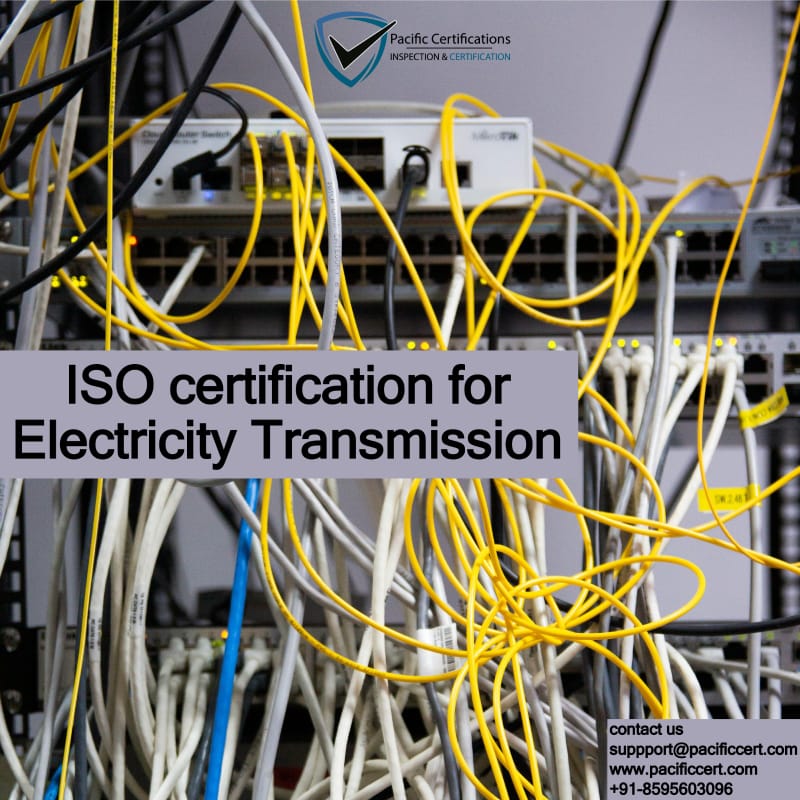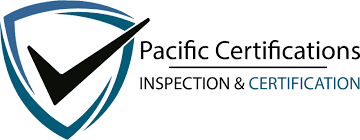ISO Certifications for Electricity Transmission Services, Requirements and Benefits

Introduction
Electricity transmission services form the backbone of national and regional power systems, enabling bulk electricity transfer from generation facilities to distribution networks and large consumers. These services include operation and maintenance of high-voltage transmission lines, substations, transformers, switchyards, protection systems, grid control centers, and cross-border interconnections. Reliability, system stability, and safety are critical, as failures can lead to large-scale outages, economic disruption, and public safety risks.
Electricity transmission organizations manage extensive high-value infrastructure operating under extreme electrical, environmental, and climatic conditions while complying with strict grid codes, safety regulations, and reliability standards. With aging networks, renewable integration, and cyber risks increasing, ISO certifications have become an essential framework for electricity transmission service providers to demonstrate structured governance, asset integrity, risk control, environmental responsibility, and operational resilience.
In electricity transmission, reliability is engineered through discipline, not chance.
Quick Summary
ISO certifications provide electricity transmission service providers with internationally recognized frameworks to manage service quality through ISO 9001, occupational health and safety through ISO 45001, asset and grid infrastructure reliability through ISO 55001, risk governance through ISO 31000, environmental management through ISO 14001, energy performance through ISO 50001, information and operational technology security through ISO/IEC 27001, and continuity of critical grid operations through ISO 22301. These certifications help transmission operators ensure grid stability, protect workers, manage aging assets, and maintain compliance with regulatory and reliability requirements.
For more information on how we can assist your electricity transmission organization with ISO certifications, please contact us at [email protected].
Applicable ISO Standards for Electricity Transmission Services
Below are the most relevant ISO standards applicable to electricity transmission operators and grid infrastructure providers:
ISO 55001:2024 – Asset Management Systems
ISO 55001 is a core standard for electricity transmission services, supporting lifecycle management of high-voltage lines, towers, conductors, substations, transformers, breakers, and protection systems. It enables condition-based maintenance, investment prioritization, and long-term infrastructure reliability.
ISO 31000:2018 – Risk Management
Electricity transmission networks face risks related to cascading failures, extreme weather, equipment aging, and grid instability. ISO 31000 provides a structured approach to identifying, evaluating, and mitigating operational, safety, and systemic risks.
ISO 45001:2018 Occupational Health and Safety Management Systems
Transmission operations involve high-voltage exposure, working at heights, live-line maintenance, and remote environments. ISO 45001 establishes controls to reduce accidents, manage emergency response, and protect skilled technical personnel.
ISO/IEC 27001: Information Security Management Systems (ISMS)
Modern transmission grids rely on SCADA, EMS, and digital protection systems. ISO/IEC 27001 safeguards operational technology, grid data integrity, and system availability against cyber threats.
ISO 14001:2015 Environmental Management System (EMS)
Transmission infrastructure impacts land use, biodiversity, and communities. ISO 14001 supports environmental impact control, right-of-way management, and regulatory compliance.
Click here to find out more applicable standards to your industry
What are the Requirements of ISO Certifications for Electricity Transmission Services?
Electricity transmission service providers seeking ISO certification must establish and maintain documented policies, procedures, and records aligned with the selected ISO standards. Key requirements include the following:
ISO 9001:2015 – Quality Management Systems
Establish a documented quality management system
Define grid operation, maintenance, and outage management processes
Monitor performance and corrective actions
ISO 55001:2014 – Asset Management Systems
Identify critical transmission assets
Plan lifecycle maintenance and renewal
Monitor asset condition and failure risks
ISO 45001:2018 – Occupational Health and Safety
Identify hazards related to high voltage and working at heights
Implement safety procedures and emergency controls
Monitor incidents and safety performance
ISO/IEC 27001:2022 – Information Security Management
Identify critical grid control and data systems
Implement access and cybersecurity controls
Monitor and manage security incidents
ISO 22301:2019 – Business Continuity Management
Identify critical transmission functions
Develop contingency plans for grid disruptions
Tip:Start by mapping your transmission lifecycle—from grid planning and construction to live operation, maintenance, fault response, and system restoration—against ISO requirements to identify asset, safety, and cyber-risk gaps early.
For further information on how we can assist your electricity transmission services with ISO certifications, contact us at [email protected].
What are the Benefits of ISO Certifications for Electricity Transmission Services?
ISO certifications are suitable for national grid operators, transmission utilities, cross-border interconnection operators, and independent transmission companies. Key benefits include:
Improved grid reliability and outage prevention, supporting national energy security.
Stronger asset lifecycle control, reducing failures and deferred maintenance risks.
Enhanced worker safety in high-risk operations, lowering incidents and downtime.
Better control of operational and cyber risks, protecting critical infrastructure.
Improved environmental and regulatory compliance, supporting permits and approvals.
Greater resilience to extreme weather and system disturbances, ensuring continuity.
Electricity transmission networks worldwide are under increasing pressure from aging infrastructure and rapid energy transition. Industry assessments show that over 35–40% of transmission assets in mature power systems are more than 40 years old, increasing failure probability and maintenance costs. At the same time, integration of renewable generation and cross-border power flows has significantly increased grid complexity, driving stricter reliability and cybersecurity requirements from regulators.
Operational benchmarking indicates that transmission operators implementing structured asset, safety, and risk management systems achieve 15–25% reductions in unplanned outages, safety incidents, and emergency maintenance activities. Looking toward 2030, adoption of ISO 55001, ISO 31000, and ISO/IEC 27001 is expected to accelerate as governments and investors prioritize resilient, digitally secure transmission networks capable of supporting decarbonized power systems.
How Pacific Certifications Can Help
Pacific Certifications, accredited by ABIS, acts as an independent certification body for electricity transmission service providers by conducting impartial audits against applicable ISO standards. Our role is to objectively assess whether documented management systems and operational practices conform to international ISO requirements, based strictly on verifiable evidence and operational records.
We support electricity transmission organizations through:
Independent certification audits conducted in accordance with ISO/IEC 17021
Practical assessment of real grid operations, asset controls, and safety systems
Clear audit reporting reflecting conformity status and certification decisions
Internationally recognized ISO certification upon successful compliance
Surveillance and recertification audits to maintain certification validity
If you need support with ISO certification for your electricity transmission services, contact us at [email protected] or +91-8595603096.
Author:Ashish
Ready to get ISO certified?
Contact Pacific Certifications to begin your certification journey today!
Suggested Certifications –
Read more: Pacific Blogs

